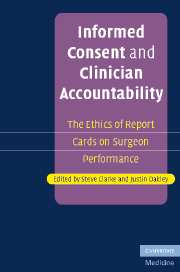Book contents
- Frontmatter
- Contents
- List of contributors
- Acknowledgements
- Introduction: Accountability, informed consent and clinician performance information
- Part I Accountability
- Part II Informed consent
- Part introduction
- 7 Informed consent and surgeons' performance
- 8 The value and practical limits of informed consent
- 9 Against the informed consent argument for surgeon report cards
- 10 Trust and the limits of knowledge
- 11 Surgeons' report cards, heuristics, biases and informed consent
- 12 Report cards, informed consent and market forces
- Part III Reporting performance information
- Index
- References
Part introduction
Published online by Cambridge University Press: 08 August 2009
- Frontmatter
- Contents
- List of contributors
- Acknowledgements
- Introduction: Accountability, informed consent and clinician performance information
- Part I Accountability
- Part II Informed consent
- Part introduction
- 7 Informed consent and surgeons' performance
- 8 The value and practical limits of informed consent
- 9 Against the informed consent argument for surgeon report cards
- 10 Trust and the limits of knowledge
- 11 Surgeons' report cards, heuristics, biases and informed consent
- 12 Report cards, informed consent and market forces
- Part III Reporting performance information
- Index
- References
Summary
Informed consent
One of the main lines of argument for publishing surgeon performance information appeals directly to the doctrine of informed consent. It is a commonplace in medical ethics that a significant medical procedure cannot ordinarily be conducted on a patient without that patient's consent. It is also widely accepted that consent cannot be effectively provided unless it is grounded on a proper basis of relevant information. Hence the phrase ‘informed consent’. It has become standard in medical practice, and indeed in medical law, to hold that medical professionals have a responsibility to ensure that patients have given their effective informed consent, before a significant medical procedure can be conducted.
The first chapter in this section, by Steve Clarke and Justin Oakley, argues that standard treatments of the doctrine of informed consent, such as that due to Faden and Beauchamp (1986), have implicitly been committed to the provision of surgeons' performance information to prospective patients before a surgical operation can take place. Standard treatments of the doctrine of informed consent concur on the requirement that all significant risks involved in undergoing an operation must be disclosed to a patient before that operation can take place. The significant risks of an operation will vary, inter alia, according to the performance abilities of the surgeon undertaking the operation. Clarke and Oakley argue that, because standard treatments of the doctrine of informed consent require that the actual risks of an operation be disclosed, this doctrine implicitly requires that the performance abilities of prospective surgeons who may be conducting the operation in question be disclosed.
- Type
- Chapter
- Information
- Informed Consent and Clinician AccountabilityThe Ethics of Report Cards on Surgeon Performance, pp. 109 - 110Publisher: Cambridge University PressPrint publication year: 2007



